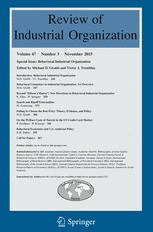Academic articles
Practitioner articles
Working papers
Books
Book chapters
Case studies
Other publications
Subject(s)
Human resources management/organizational behavior
Keyword(s)
Motivation to lead, self-to-leader comparisons, self-efficacy perceptions, leader identity
Drawing on social comparison and identity literature, we suggest that individuals' comparisons of themselves to their own standards of leadership relate to their leadership motivation. We propose and test a model of motivation to lead (MTL) based on two types of self-to-leader comparisons: self-to-exemplar and self-to-prototype comparisons with respect to affiliation. In our main study, using data from a sample of 180 executives, we apply structural equation models to test our predictions. We find that self-comparisons with concrete, influential leaders of the past or present (self-to-exemplar comparisons) relate positively to MTL. We also find that self-comparisons with more general representations of leaders (self-to-prototype comparisons in affiliation) relate to MTL. Whereas the effect of self-to-exemplar comparisons is mediated through individuals' leadership self-efficacy perceptions, the effect of self-to-prototype comparisons is not. We replicate these findings in three follow-up studies using different research designs. We derive implications for theory and practice.
With permission of Elsevier
Volume
26
Journal Pages
802–820
Subject(s)
Economics, politics and business environment; Finance, accounting and corporate governance
Keyword(s)
Sophistication, naiveté, credit market, consumer exploitation
In the presence of naive consumers, a participation distortion arises in competitive markets because the additional profits from naive consumers lead competitive firms to lower transparent prices below cost. Using a simple calibration, we argue that the participation distortion in the US credit-card market may be large. Our results call for a redirection of some of the large amount of empirical research on the quantification of the welfare losses from market power, to the quantification of welfare losses that are due to the firms’ reactions to consumer misunderstandings.
© Springer Science+Business Media New York 2015. With permission of Springer
Volume
47
Journal Pages
341–354
Subject(s)
Economics, politics and business environment
Keyword(s)
Primary school enrollment, school lunches, natural experiment, ITT
At the end of 2001, the Indian Supreme Court issued a directive ordering states to institute school lunches – known locally as "midday meals" – in government primary schools. This paper provides a large-scale assessment of the enrollment effects of India's midday meal scheme, which offers warm lunches, free of cost, to 120 million primary school children across India and is the largest school feeding program in the world. To isolate the causal effect of the policy, we make use of staggered implementation across Indian states in government but not private schools. Using a panel data set of almost 500,000 schools observed annually from 2002 to 2004, we find that midday meals result in substantial increases in primary school enrollment, driven by early primary school responses to the program. Our results are robust to a wide range of specification tests.
© The editors of The Scandinavian Journal of Economics 2015
Volume
117
Journal Pages
1176–1203
ISSN (Online)
1467-9442
Subject(s)
Economics, politics and business environment
Keyword(s)
Competition, Germany
Secondary Title
The handbook of competition economics 2016
Pages
57–59
Subject(s)
Economics, politics and business environment
Volume
2015
Journal Pages
1–13
Subject(s)
Ethics and social responsibility; Strategy and general management
Keyword(s)
Stakeholder route, sustainability management
Secondary Title
JFBS annual book 2015: Sustainability and strategy
Pages
15–43
ISBN
978-4805110706
Subject(s)
Economics, politics and business environment
Keyword(s)
Payment card networks, interchange fees, two-sided markets
JEL Code(s)
L11, G21, L42, L51, K21
Pages
34
Subject(s)
Marketing
Keyword(s)
Cross-selling, personal selling
JEL Code(s)
M310
Journal Pages
62–65
Subject(s)
Economics, politics and business environment; Health and environment; Strategy and general management; Technology, R&D management
Keyword(s)
Decentralized, energy, Germany, Energiewende
JEL Code(s)
O31, Q420, Q480
Germany has embarked on a journey to fundamentally transform its energy supply system: the energy turnaround, or “Energiewende” as it is known. But the country that kick-started the PV movement around a decade ago has since been superseded by even more ambitious nations. So can Germany become a game-changer once more?
Volume
27
Journal Pages
85–88
Subject(s)
Human resources management/organizational behavior
Keyword(s)
Sensemaking, spousal support, career decision making, family identity
This paper contributes to a growing body of literature on the role of family in managers’ career decision making. Specifically, we offer an empirical elaboration on a recently proposed concept of the “family-relatedness of work decisions” (FRWD) by illuminating the role of the spouse in managers’ career sensemaking. Eighty-eight managers who were in the final stage of their EMBA program took part in the study. The data were gathered through a personal career inventory. The findings revealed that next to family-career salience and parent role identification, spouses also play an important role in shaping managers’ family-related career sensemaking. Future research should examine the supportive role of spouses in contexts other than that of an international EMBA. Moreover, researchers should examine the role of managers’ boundary management styles in shaping the degree of their family-related career sensemaking. Our paper suggests that when designing and implementing developmental initiatives, organizations should consider that managers’ decisions about their next career steps may be guided by family-related concerns, and the spouse may play a specific role. This paper offers the first empirical exploration and a refinement of the nascent theory of the “family-relatedness of work decisions”. It also introduces a new construct into the theory – spousal career support – that opens new avenues for future research.
With permission of Emerald
Volume
20
Journal Pages
503–524


